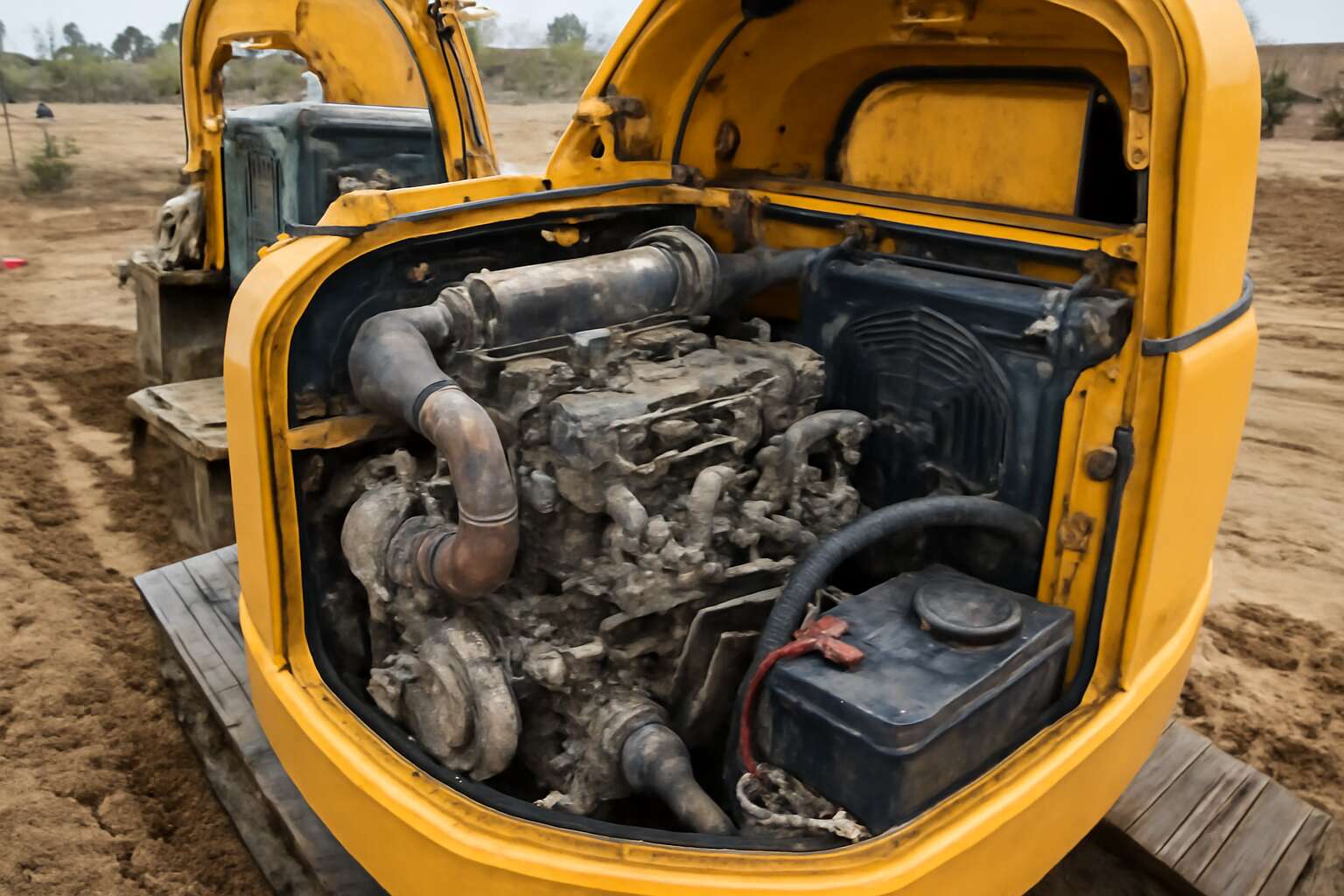Common Reasons Why Excavator Fails to Start
Electrical Issues
Nothing dampens the spirit of a hardworking excavator operator faster than the dreaded question: “Excavator will it start?” It’s a moment that transforms confident digging into frantic troubleshooting, often fueled by electrical gremlins lurking within. Electrical issues are the leading cause of excavator startup failures, and understanding them can save hours of frustration on a busy South African construction site.
Common culprits include loose or corroded battery terminals, which act like tiny sabotage agents preventing the flow of vital current. A dead or undercharged battery can also leave even the most robust machinery sulking in the corner, refusing to wake up. Additionally, faulty wiring or blown fuses can create a cascade of confusion, leaving operators wondering if their excavator has developed a personality disorder. Ensuring all electrical connections are tight and free of corrosion often makes the difference between a productive day and a prolonged game of “Will it start?”
- Corroded terminals
- Dead battery
- Blown fuse or relay
- Damaged wiring harness
In South Africa’s rugged conditions, electrical gremlins thrive, making routine checks a critical part of excavator maintenance. If your machine’s electrical system isn’t up to scratch, don’t be surprised when “excavator will it start” becomes the recurring question—and not in a good way.
Fuel System Problems
The fuel system of an excavator is often overlooked until it becomes a stubborn obstacle in the startup process. When the question “excavator will it start?” echoes through a construction site, fuel-related problems are frequently to blame. In South Africa’s challenging operating environment, dust, dirt, and inconsistent fuel quality can significantly impair the efficiency of these heavy machines.
Clogged fuel filters are a common culprit, trapping debris that restricts the flow of vital diesel to the engine. Contaminated fuel, laden with water or impurities, can also cause the engine to falter at startup, as the combustion process becomes compromised. Additionally, air leaks in the fuel lines can create an airlock, preventing fuel from reaching the engine and leaving operators staring at a machine that simply refuses to wake.
Understanding these potential pitfalls is essential, especially in rugged conditions where fuel system issues tend to surface more frequently. After all, a reliable excavator starts with a clean, well-maintained fuel system—otherwise, the question remains: “excavator will it start?”
Starter System Failures
When the massive machinery of an excavator stands silent at dawn, the haunting question echoes across the construction site: “excavator will it start?” In South Africa’s rugged terrain, this dilemma is more than mere inconvenience—it’s a disruption that can halt progress in its tracks. Among the myriad reasons why an excavator might refuse to awaken, failures within the starter system loom large. These failures can be as subtle as a worn-out solenoid or as dramatic as a damaged starter motor, each whispering tales of neglect or wear over time.
Often, the root of the issue lies deep within the starter’s intricate dance with the electrical circuit. Corrosion, loose connections, or faulty wiring can all conspire to cut off the vital spark needed to breathe life into the beast. Sometimes, the culprit is a weak or dead battery, drained by relentless dust and dirt settling into every crevice of the machine. When these elements combine, they create a perfect storm—causing frustration and leaving operators pondering, “Will my excavator start today?”
- Electrical connection failures
- Worn or damaged starter motor
- Weak or dead battery
- Faulty ignition switch
Understanding these common reasons not only prevents unexpected downtime but also ensures the mighty excavator remains a steadfast partner in the relentless rhythm of construction. After all, when the question arises—“excavator will it start?”—a well-maintained starter system is the key to unlocking its potential, no matter the terrain.
Engine Mechanical Issues
Mechanical issues beneath the engine’s robust exterior can quietly sabotage the startup process of an excavator, transforming a reliable workhorse into a dormant giant. When the engine refuses to roar to life, often the root lies in internal components that endure relentless stress and wear, unseen yet critical. Worn piston rings, for instance, can cause compression loss, making it impossible for the engine to generate the necessary power to start. Similarly, damaged valves or a compromised timing belt can throw the delicate synchronization into chaos, resulting in frustrating silence.
In some cases, the problem isn’t as obvious as a mechanical failure but involves the intricate interplay of fluid systems. Low oil pressure or contaminated fuel can choke the engine’s vital functions, preventing ignition altogether. An often-overlooked culprit is a clogged air filter—imagine trying to breathe through a straw—restricting airflow and starving the engine of oxygen needed for combustion. The question, “excavator will it start?” hinges not only on electrical and fuel systems but also on these hidden mechanical complexities that demand careful inspection.
Other Mechanical or Hydraulic Problems
When an excavator refuses to awaken from its mechanical slumber, the frustration can be palpable. Beyond the obvious electrical or fuel issues, there are other mechanical and hydraulic culprits lurking in the shadows. Hydraulic system failures, for example, can hinder the excavator’s ability to operate smoothly, especially if hydraulic fluid levels are low or if leaks have compromised pressure. Such problems might not prevent the engine from turning over but can render the machine immobile.
Sometimes, the root of the question “excavator will it start?” lies in the hydraulic valves or worn-out seals that restrict fluid flow, impairing essential movements. Additionally, a faulty hydraulic pump can create a cascade of issues, stalling the entire operation. These silent saboteurs often go unnoticed until the machine’s startup becomes an insurmountable challenge, emphasizing the importance of thorough inspections that include hydraulic health checks.
In rare cases, the issue may be a simple but overlooked problem such as a blocked air intake or a seized engine component, which can be surprisingly common in dusty environments. Recognizing these subtle yet critical mechanical and hydraulic problems can mean the difference between a swift repair and prolonged downtime, making understanding these hidden issues essential for anyone asking, “excavator will it start?”
Troubleshooting Steps for Excavator Not Starting
Initial Visual Inspection
When your trusty excavator will it start, and you’re suddenly faced with that nerve-wracking silence, it’s easy to feel like you’ve hit a mechanical dry spell. Surprisingly, a significant chunk of starting issues can be traced back to a straightforward culprit—visual clues. Think of it as a mechanic’s treasure hunt; a keen eye can spot trouble before it morphs into costly repairs. First, check for obvious signs of damage or leaks. A quick glance might reveal cracked hoses, loose wires, or a drained battery—common villains in the saga of “excavator will it start”.
Next, inspect the battery terminals for corrosion or loose connections—these tiny nuisances can cause big headaches. If the battery appears healthy, move on to the fuel system and look for blockages or contaminants that could be sabotaging your start-up efforts. Sometimes, the issue isn’t complex but simply a matter of a dirty filter or a loose clamp. Remember, troubleshooting begins with the basics—often, the simplest visual inspection can save hours of frustration and hefty repair bills.
Testing Electrical Components
When your excavator refuses to fire up, it can feel like a moment frozen in time—almost philosophical in its frustration. Yet, beneath that initial panic lies a realm of methodical troubleshooting that can often unveil simple, overlooked issues. Testing electrical components is a pivotal step in diagnosing why your excavator will it start, especially when other avenues have been exhausted. Electrical faults don’t always announce themselves with sparks or smoke; sometimes, they lurk quietly within wiring harnesses or relays, waiting for the right moment to sabotage your efforts.
One fundamental approach involves visually inspecting the wiring and connections for corrosion, wear, or loose terminals. These seemingly minor issues can interrupt the flow of current, rendering your machine unresponsive. To ensure nothing is missed, a systematic check can be performed—using a multimeter to verify voltage levels and continuity across critical components. This process not only pinpoints faults but also reinforces your understanding that sometimes, the root cause is hidden in the details.
Here’s a quick overview of steps to consider when troubleshooting the electrical system of your excavator:
- Check the battery voltage and condition.
- Inspect fuses and relays for signs of failure or damage.
- Test the ignition switch for proper operation.
- Verify wiring integrity and look for corrosion or frayed cables.
- Use diagnostic tools to scan for error codes or electrical anomalies.
Understanding that electrical issues may be subtle and complex, patience often reveals the underlying cause. Remember, each component in the electrical circuit is part of a delicate network—disrupt one link, and your excavator will it start, or perhaps, won’t start at all. This nuanced process underscores why thorough testing of electrical components not only saves time but preserves the lifespan of your valuable machinery.
Checking Fuel System
When an excavator refuses to start, the cause isn’t always obvious. Sometimes, it’s a sneaky issue lurking beneath the surface—hidden within the fuel system, waiting to derail your operation. Fuel system problems are among the most common culprits, especially in South Africa’s unpredictable climate where fuel quality can vary unexpectedly. A clogged filter or contaminated fuel can silently sabotage your efforts, leaving you wondering, “Why won’t my excavator start?”
To diagnose whether the fuel system is at fault, start with a straightforward check: ensure the fuel tank has adequate supply and that the fuel lines are clear. Next, verify that the fuel filter isn’t clogged and that the fuel pump is functioning properly. Sometimes, the issue is as simple as an air lock in the system or a faulty sensor sending false signals to the engine management system. Troubleshooting in this realm can involve
- inspecting fuel injectors
- checking for leaks
or testing fuel pressure with specialized tools.
By systematically ruling out these potential faults, you can uncover whether the reason your excavator will it start lies within the fuel system, or if you need to explore other mechanical or electronic avenues. Remember, in the world of heavy machinery, patience and precision are your best allies when confronting fuel system woes.
Engine and Mechanical Checks
In the relentless rhythm of construction and excavation, the question often echoes in the minds of operators and mechanics alike: “Will the excavator start today?” With South Africa’s unpredictable climate and variable fuel quality, this query takes on a new weight of urgency. Sometimes, the root of the problem lies not in the obvious, but in subtle mechanical whispers that demand keen attention and deep introspection.
When troubleshooting an excavator that won’t start, it’s essential to approach the problem with a systematic mindset. Mechanical checks can reveal underlying issues that are easily overlooked—such as wear in the starter gear, corrosion on electrical contacts, or hydraulic system anomalies that interfere with engine ignition. A thorough inspection involves:
- Listening for unusual sounds during attempted startup.
- Inspecting the engine’s compression levels—low compression can be a silent assassin.
- Checking for leaks or cracks in critical mechanical components like the timing belt or pistons.
Patience here isn’t just a virtue; it’s a necessity. Every component, every connection, must be examined with an eye for the unseen. Only then can you begin to unravel whether the issue of whether the excavator will it start is rooted in mechanical failure or something more insidious lurking beneath the surface.
Consulting Diagnostic Codes
When an excavator refuses to spring to life, the frustration is real — and the stakes are high in South Africa’s rugged construction sites. Troubleshooting the question “excavator will it start” becomes an urgent quest, demanding more than just guesswork. One powerful tool in this quest is consulting diagnostic codes. Modern excavators are equipped with onboard computer systems that silently record the whispers of mechanical distress. These codes act like a hidden language, revealing issues that might not be immediately apparent.
By connecting a diagnostic scanner to the machine, operators and mechanics can unlock a treasure trove of insights. The process involves scanning for error codes, which can point to specific problems such as sensor failures or hydraulic anomalies that impact starting. Often, these codes guide the technician directly to the root cause, saving valuable time and effort in the field. Remember, in the battle to determine whether the excavator will it start, understanding these signals can be the key to swiftly restoring power and productivity.
Preventative Maintenance Tips to Avoid Starting Problems
Regular Inspection and Servicing
Ensuring your excavator will it start when needed is no accident—it’s the result of diligent preventative maintenance. In the rugged landscapes of South Africa, where construction sites often test equipment to its limits, a well-maintained excavator can be the difference between project success and costly delays. Regular inspection and servicing are the secret ingredients that keep your machine humming smoothly, even in the most challenging conditions.
By establishing a routine that includes checking fluid levels, tightening bolts, and inspecting hydraulic hoses, operators can significantly reduce the risk of unexpected starting problems. Remember, a small oversight today can lead to a major failure tomorrow! Keep a detailed maintenance log, and don’t rush through inspections—attention to detail can prevent those nerve-wracking moments when you ask yourself, “Will it start?” every morning.
- Performing visual checks for leaks or corrosion
- Monitoring battery health and connections
- Replacing worn-out filters promptly
Through consistent servicing, you transform your excavator into a resilient workhorse, ready to tackle the day’s challenges with confidence. After all, when your machinery is in top shape, the question isn’t just about whether it will start—it’s about how reliably it will keep working, no matter what!
Electrical System Upkeep
In the world of rugged South African construction sites, the question often echoes in the early morning silence: “Will it start?” The reliability of your excavator can make or break a project, especially when unforeseen electrical issues threaten to halt progress. Preventative maintenance is the unsung hero, transforming a temperamental machine into a steadfast workhorse ready to face the day.
A crucial aspect of ensuring your excavator will it start lies in meticulous electrical system upkeep. Corrosion on battery terminals, loose connections, or worn wiring can quietly sabotage your efforts before the workday begins. Regularly inspecting and cleaning electrical contacts, coupled with testing the integrity of batteries and fuses, keeps the current flowing where it should.
To further fortify your machine against starting woes, consider implementing a systematic approach:
- Schedule routine inspections of all electrical components, especially after heavy use or adverse weather conditions.
- Ensure that battery terminals are free from corrosion and securely connected.
- Replace worn or damaged wiring promptly to prevent short circuits.
- Use diagnostic tools to monitor electrical system health, catching issues before they escalate.
It’s like tending to a delicate ecosystem—each element working in harmony to ensure your excavator will it start when needed. When electrical upkeep is woven into your maintenance routine, doubts fade and confidence grows. After all, in the rugged landscapes of South Africa, a dependable excavator isn’t just a machine; it’s the heartbeat of every project.
Proper Storage and Handling
In the unforgiving landscapes of South Africa’s construction sites, the question of whether an excavator will it start can be the thin line between a productive day and costly delays. Proper storage and handling are essential components of preventative maintenance that often go unnoticed but hold immense power in ensuring machine reliability. An excavator left exposed to harsh weather or improper storage can suffer from corrosion, battery drain, or mechanical deterioration, all of which jeopardize its ability to start when needed.
To safeguard your investment, consider the environment in which your excavator is kept. Covering the machine with weather-resistant tarps, storing it in sheltered areas, and ensuring it’s parked on level, dry ground can dramatically extend its lifespan. Additionally, regularly checking fluid levels and keeping components clean during storage prevents the buildup of debris or corrosion that can impede starting. When handled with care, an excavator’s resilience is greatly enhanced, making it more likely that it will it start without fuss—even after prolonged periods of dormancy.
Remember, the art of preventative maintenance is rooted in consistency. Implementing simple yet effective storage and handling practices transforms a complex mechanical challenge into a routine that promotes unwavering dependability. Because in the end, whether in the bustling cityscape or remote construction sites, ensuring your excavator will it start is about respecting the machine’s needs and understanding that longevity is built on thoughtful care.
Use of Diagnostic Tools and Records
Nothing kills a productive day faster than an excavator that refuses to start — especially when South Africa’s unpredictable weather is throwing everything from blazing sun to sudden downpours your way. Regular preventative maintenance is your best friend in avoiding those “will it start?” moments. By leveraging diagnostic tools, you can uncover hidden gremlins lurking beneath the surface before they become full-blown starting issues. Modern machines often come equipped with diagnostic codes that act as a crystal ball, revealing potential electrical or mechanical hiccups.
Keeping detailed records of inspections and repairs isn’t just for accountants—it’s a game changer for your excavator’s reliability. Tracking patterns helps you spot recurring issues or worn components that might sabotage your efforts to get the machine going. For instance, if a recurring fault appears in the electrical system, addressing it early with diagnostic tools can save you hours of frustration and costly downtime. Remember, a well-maintained excavator isn’t just about avoiding startup problems; it’s about ensuring long-term operational confidence in South Africa’s rugged work sites.
When to Seek Professional Help
Persistent Starting Issues
When your excavator will it start seems like a simple question, it often masks a more complex puzzle. In South Africa’s dynamic construction and mining sectors, machinery downtime can translate into significant financial setbacks. Recognizing when to seek professional help is crucial, especially as persistent starting issues might hint at deeper mechanical or hydraulic concerns that require expert diagnosis. Sometimes, the root cause isn’t immediately apparent, making it essential to trust seasoned technicians who can decipher the subtle signs of impending failure.
Ignoring persistent starting problems can lead to costly repairs or even complete equipment failure. If your excavator exhibits symptoms such as unusual noises, sluggish responses, or inconsistent starting patterns despite routine checks, it’s time to consult professionals. These specialists can perform comprehensive diagnostics, ensuring that underlying issues—whether related to the hydraulic system, engine, or electrical components—are accurately identified and addressed. Remember, understanding when to seek professional help can save both time and money, keeping your project on track and machinery in peak condition.
Complex Mechanical or Electrical Failures
When the ominous silence of a stubborn excavator echoes in the shadows of your worksite, it often signals trouble beyond the surface. Persistent mechanical or electrical failures do not simply vanish; they whisper dark secrets that demand expert attention. If your excavator will it start despite routine checks, it’s a siren’s call to seek professional help before chaos unfurls. The unseen mechanical maladies—hidden beneath the armor of hydraulic systems or tangled within electrical wiring—can swiftly escalate into catastrophic failures.
Recognizing when to summon the craftsmen of machinery is crucial. Signs such as unexplainable vibrations, unexplained leaks, or fluctuating power levels are clues that point towards deeper affliction. In South Africa’s rugged terrains, where machinery is pushed to its limits, overlooking these signals can lead to costly breakdowns. A seasoned technician wields diagnostic tools that can uncover the clandestine faults lurking beneath the surface, ensuring your excavator’s heart continues to beat in the darkness.
Safety Concerns
When your excavator will it start despite all the routine checks, it’s a clear sign that professional help is needed—fast. Safety should never be compromised, especially when dealing with heavy machinery on a South African worksite where unpredictable terrain can turn a minor glitch into a major disaster. Ignoring persistent starting issues or strange noises can lead to catastrophic failures and expensive downtime. If your excavator refuses to roar to life, it’s not just a minor inconvenience; it’s a red flag demanding expert intervention.
Remember, machinery problems can escalate quickly and pose serious safety hazards. Signs such as unusual vibrations, unexplained leaks, or erratic movements mean it’s time to call in the specialists. Don’t risk pushing the equipment beyond its limits—diagnostic tools and seasoned technicians can identify hidden faults before they turn your worksite into chaos. When your excavator will it start but then falters, seeking professional assistance isn’t just wise—it’s essential for your safety and your bottom line.
Choosing a Qualified Service Provider
When your excavator will it start despite routine checks, recognizing the right moment to seek professional help is crucial. Machinery can be unpredictable, especially when operating on South African sites where rough terrain and variable weather add layers of complexity. If your excavator exhibits persistent starting issues, it’s a clear sign that specialized diagnostics are needed to prevent costly downtime or safety hazards.
A seasoned technician can perform comprehensive assessments that go beyond basic troubleshooting. If you notice ongoing problems such as unusual noises, delayed responses, or intermittent power, don’t hesitate. These are often symptoms of deeper mechanical or electrical faults that require expert intervention. Choosing a qualified service provider ensures that your equipment receives precise diagnostics and timely repairs, helping you maintain productivity and safety on site.




0 Comments